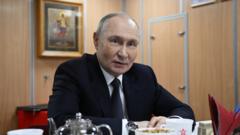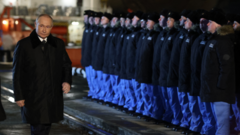A new ceasefire deal brokered by the United States aims to halt attacks in the Black Sea region, a vital area for both Russia and Ukraine, yet differences in interpretation and underlying conditions threaten the agreement's viability.
Russia and Ukraine Reach Black Sea Ceasefire Agreement Amidst Ongoing Tensions

Russia and Ukraine Reach Black Sea Ceasefire Agreement Amidst Ongoing Tensions
Negotiations mediated by the U.S. result in a fragile deal for Black Sea shipping, but full compliance remains uncertain.
In a significant yet ambivalent development, Russia and Ukraine have reached a tentative agreement to cease hostilities in the strategically important Black Sea, mediated by the United States. However, the future effectiveness of this deal is far from guaranteed. Both nations rely heavily on the sea for agricultural exports, which have faced severe disruptions throughout the drawn-out conflict.
The Kremlin has stipulated that it will comply with the ceasefire only if certain sanctions on its agricultural exports are lifted. These sanctions have been imposed by both the U.S. and the European Union, making their removal a complex and potentially protracted process. Misinterpretations of the agreement further complicate the situation; Russia views it as a revival of the 2022 U.N.-backed framework granting it influence over maritime commercial activities, while Ukraine maintains a strong stance against any Russian naval presence in the western Black Sea, crucial for its exports.
The lack of trust between the two nations was evident as both sides accused each other of violating the truce shortly after its announcement. Ukraine reported an attack on Mykolaiv, while Russia claimed to have intercepted two drones over the Black Sea, underscoring the precariousness of the situation.
The conditions set forth by Russia indicate its reluctance to expedite an end to the hostilities. With a supportive administration in Washington and its military currently gaining ground on the battlefield, Moscow appears focused on extracting as many concessions as possible before making any commitments. One significant demand is the reconnection of its state agricultural bank and related financial institutions to the international SWIFT payment system, a critical element for facilitating food and fertilizer trade.
As both countries grapple with stark differences in expectations and outcomes, the path forward remains riddled with uncertainty and caution, leaving the Black Sea region in a precarious position.



















